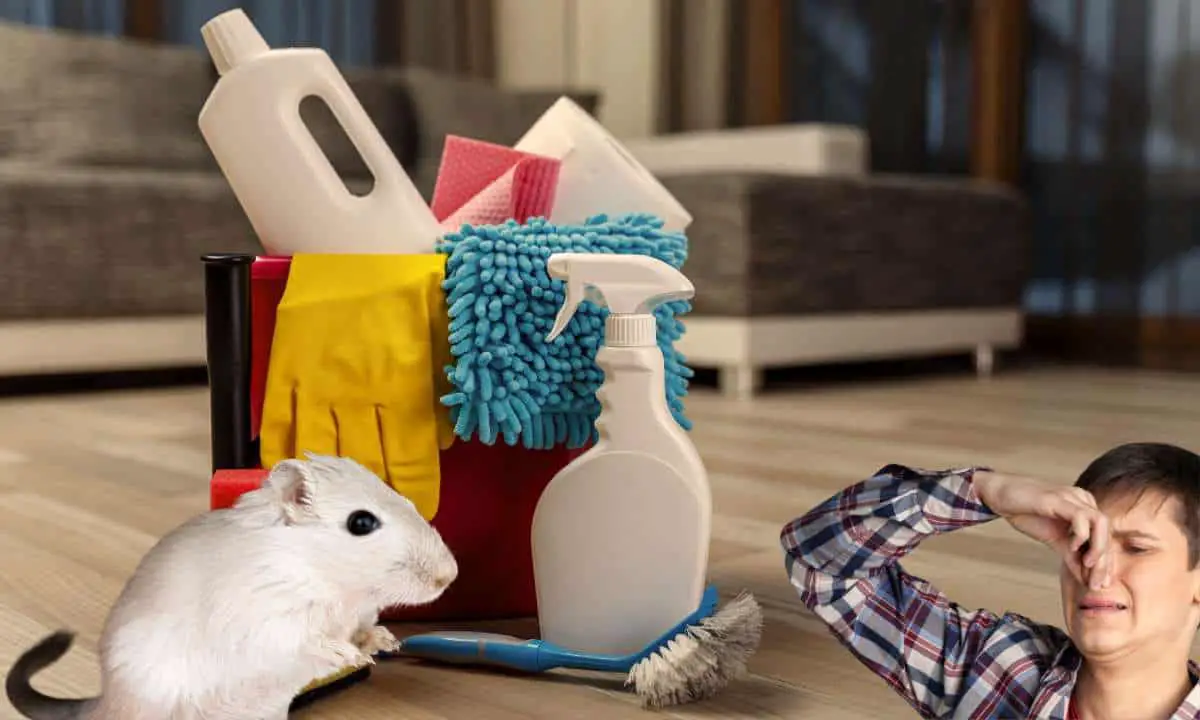As a gerbil owner, you want to ensure that your pets live in a clean and healthy environment. One of the most crucial tasks in this regard is cleaning their cage regularly.
A clean cage not only promotes your gerbil’s well-being but also enhances their overall quality of life.
To help you with this essential aspect of gerbil care, we’ve created “The Ultimate Step-by-Step Guide to Cleaning Your Gerbil’s Cage.
In this comprehensive guide, we’ll provide you with all the information you need to know about why cleaning a gerbil’s cage is important and how to do it efficiently and effectively. So, let’s get started!
Table of Contents
What You Need to Know About Cleaning Your Gerbil’s Cage
Why is it important to clean the gerbil cage?
Cleaning your gerbil’s cage is vital for maintaining their health and well-being. Gerbils, like any small pet, require a clean and comfortable living environment to thrive.
A dirty cage can harbor bacteria and parasites, potentially causing illnesses and severe health conditions. To keep your gerbils happy and healthy, regular cleaning is necessary.
How often should you clean the gerbil cage?
Keeping your gerbil’s cage clean is an ongoing process that involves daily attention and a more in-depth clean every few weeks. It’s essential to spot-clean the cage daily, removing soiled bedding, uneaten food, or other waste.
Every two weeks, perform a thorough cleaning, which includes completely removing and replacing all bedding, toys, and accessories in your gerbil’s cage.
What tools and supplies do you need to clean the gerbil cage?
To clean your gerbil’s cage efficiently, you’ll need the following essential supplies:
- Paper towels
- Clean bedding
- Litter
- A scoop or small shovel
- A water bottle
- Disinfectant cleaner

Step-by-Step Guide to Cleaning Your Gerbil’s Cage
Step 1: Spot Clean Daily
Every day, you should spot-clean your gerbil’s cage. This means removing any soiled bedding, uneaten food, or other waste that you notice.
Additionally, check to ensure your gerbils have plenty of food and water, and that their cage accessories are in good condition.
Step 2: Remove Your Gerbil from the Cage
Before beginning the deeper cleaning process, remove your gerbils from the cage.
Place them in a secure, temporary home, such as a travel carrier or another cage, while you work on their main living space.
Step 3: Discard Soiled Bedding and Litter
With your gerbils safely out of the way, begin the deeper cleaning process. First, use a scoop or small shovel to remove any soiled bedding, litter, or debris from the cage bottom.
Dispose of it in a trash bag, and wash your hands thoroughly afterward.
Step 4: Clean and Disinfect the Cage
After cleaning the cage with soap and water, rinse it thoroughly to ensure no residue remains.
Allow the cage and accessories to air dry, making sure they are completely dry before moving on to the next step.
Step 5: Replace Bedding and Litter
Once the cage is clean and dry, replace the bedding and litter with fresh materials suitable for your gerbils.
Add toys, tunnels, food dishes, and other accessories you removed during the cleaning process. Finally, refill the water bottle and food dish with fresh food and water.
Once the cage is clean and dry, replace the bedding and litter with fresh materials suitable for your gerbils.
Add toys, tunnels, food dishes, and other accessories you removed during the cleaning process. Finally, refill the water bottle and food dish with fresh food and water.
Choosing the Right Bedding and Litter for Your Gerbil’s Cage
Choosing the right bedding and litter for your gerbil’s cage is essential to ensure their health and happiness. Gerbils are active pets that love to burrow, so providing adequate bedding is crucial for their well-being.
Safe and Absorbent Bedding Materials
There are several suitable bedding materials for gerbils, such as:
- Paper-based bedding
- Aspen shavings
- Shredded cardboard
These types of bedding materials are safe for gerbils, and they are also absorbent, which helps control odor and keep the cage clean.
Avoid Harmful Bedding Materials
It’s important to avoid using cedar or pine shavings, which contain harmful oils that can cause respiratory problems in gerbils.
Recommended Depth of Bedding
The recommended depth of bedding for gerbils is at least four inches. This depth allows the gerbil to burrow and make tunnels comfortably.
Gerbils love to burrow and create complex tunnel systems, which is why providing ample bedding is essential.
It’s important to regularly clean and replace the bedding to avoid the buildup of bacteria and unpleasant odor.
Choosing the Right Litter for Your Gerbil’s Cage
Aside from bedding, litter is also an essential item for a gerbil’s cage. Gerbils are clean animals and will use a litter box if provided with one. However, it’s important to use the right type of litter.
Safe Litter Options
Avoid clumping litter, as ingesting it can cause blockages in the gerbil’s digestive system. Instead, consider using:
- Wood pellets
- Recycled paper
- Sand
These options are great for gerbil litter and can make cleaning the cage easier and more enjoyable for your pet.
Overall, choosing the right bedding and litter for your gerbil’s cage is crucial to their health and happiness. Suitable bedding materials, such as paper-based bedding, aspen shavings, and shredded cardboard, are absorbent and safe for gerbils.
Avoid using cedar or pine shavings, as these contain harmful oils that can cause respiratory problems. Providing a recommended depth of at least four inches of bedding allows the gerbil to burrow and make tunnels.
Additionally, using the right type of litter, such as wood pellets, recycled paper, or sand, can make cleaning the cage easier and more enjoyable for your pet.
Gerbils and Sand Baths: A Key to Maintaining Hygiene
Gerbils are clean animals and require regular grooming for their hygiene. One way to help them is by providing sand baths.
Sand baths help them maintain their fur’s condition and remove any excess oil and dirt. It is also an excellent way to keep their nails trimmed down naturally.
Choosing the Right Sand for Gerbils
To provide your gerbils with a sand bath, it is crucial to choose the right type of sand. Commercially available dust-free chinchilla or children’s play sand is the best type of sand to use for gerbils.
Never use beach sand or outdoor soil; it contains harmful bacteria and parasites that can cause your gerbil to get sick.
It is important to note that under no circumstances should you use dusting powders as it can cause respiratory problems.
Setting Up a Sand Bath Container
When setting up a sand bath for your gerbils, use a container that is deep enough for them to roll around in comfortably.
Fill the container with enough sand for the gerbils to burrow in, but not too deep that they will have trouble emerging. It is a good idea to provide a sand bath container permanently present in the cage.
Maintaining Your Gerbil’s Sand Bath
Maintain the sand bath by:
- Removing the droppings, debris, and any unusable sand within a day or two of use or whenever it looks dirty.
- Providing new sand once a week or every other week, depending on use.
Benefits of Sand Baths
In conclusion, sand baths are an essential part of your gerbil’s hygiene. It helps in keeping their fur clean and free of excess oils and dirt, which can lead to bacteria and parasites.
Choosing the correct type of sand is vital, and it is crucial to avoid using beach sand and dusting powder.
A Clean and Healthy Environment for Your Gerbils
The sand bath container needs to be deep enough and regularly maintained to ensure that it remains fresh and safe for your gerbils.
A sand bath container is an essential item to have in your gerbil’s cage, and it is one of the most effective ways of keeping them happy, healthy, and clean.
Regular maintenance and providing the right sand bath materials contribute to a clean environment for your pet gerbils.
VI. Signs Your Gerbil’s Cage Needs More Frequent Cleaning
So, you’ve noticed that your gerbil’s cage is starting to get a little ripe, huh? There are a few signs that can indicate when it’s time to step up your cleaning game.
Strong Ammonia Smell and Waste Buildup
First of all, if you’re noticing a strong ammonia smell in the cage area, that’s a pretty clear indication that it’s time for a deep clean. Another telltale sign is a buildup of feces and urine in the cage, especially around the food and water areas.
Mold or Mildew Formation
If you’re starting to see mold or mildew forming on any surfaces in the cage, that’s also an indication that it’s time to get scrubbing.
Health Issues from a Dirty Cage
It’s not just a matter of keeping the air fresh and the cage looking good – there are real health issues that can arise if you’re not staying on top of gerbil cage cleaning.
For one thing, gerbils are prone to respiratory problems, and a dirty cage can exacerbate these issues. Plus, if your gerbils are forced to live in their own waste, they’re more likely to develop skin infections or other problems.
Unwanted Critters in the Cage
A dirty cage can attract all sorts of unwanted critters, from flies to mites, and these pests can carry diseases or cause additional irritations for your little friends.
Determining the Cleaning Frequency
It’s important to recognize that there’s not a one-size-fits-all answer when it comes to how frequently you should be cleaning your gerbil’s cage.
Factors like the size of the cage and the number of gerbils living in it can influence how much cleaning is necessary.
Deep Cleaning and Spot Cleaning
A good rule of thumb is to do a deep clean every two to four weeks, but you may need to adjust this based on what you’re noticing in the cage.
If it’s starting to get smelly or you’re seeing a lot of waste buildup, it’s time to get in there with the scrub brush a little sooner. And don’t forget to do some spot cleaning throughout the week, like scooping out any wet or dirty bedding and wiping down the food and water areas.
Conclusion
Your gerbils will thank you for maintaining a clean environment, and you’ll be able to enjoy a fresher-smelling home!
Make sure to check for signs that it’s time for a deeper clean and adjust the cleaning frequency accordingly.
VII. Safe and Effective Cleaning Products for Gerbil Cages
A. Recommended cleaning products and solutions
When cleaning your gerbil’s cage, it is important to use safe and effective cleaning products.
Some recommended cleaning supplies include mild soap, water, and a sponge to clean the inside and outside of the cage.
You can also use a pet-safe disinfectant to ensure thorough cleaning, but be sure to rinse the cage thoroughly to remove any strong chemical smells.
Recommend products:
- Cold Life Non-Abrasive Cleaning Sponges
- Nature’s Miracle Small Animal Cage Scrubbing Wipes
- Water Bottle Brush Cleaner
- No Scent Small Animal – Odor Eliminator & Cleaner
- Nature’s Miracle Cage Cleaner
B. Dangers of using toxic cleaning products
Using toxic cleaning products can be harmful to gerbils, as they have sensitive respiratory systems and are prone to stress.
Cleaning products can be toxic if ingested, and gerbils can chew on surfaces where cleaning products have been applied.
It is crucial to use non-toxic cleaning supplies to keep your gerbils safe and healthy.
C. Proper rinsing and drying procedures
After cleaning your gerbil’s cage, it is important to rinse it thoroughly to remove any soap or disinfectant residue. Use clean, warm water to rinse the cage several times to ensure all cleaning products have been removed.
Once the cage is clean, pat it dry with paper towels and allow any remaining moisture to air dry.
In addition to cleaning the cage, remember to clean food dishes and water bottles regularly to ensure a healthy environment for your pet gerbil.
By following these guidelines and using safe cleaning products, you can keep your gerbil’s cage clean and odor-free while ensuring their health and well-being.
VIII. Reducing Stress for Your Gerbils During the Cleaning Process
A. Minimizing Stress During Temporary Removal from the Cage
When cleaning a gerbil cage, it’s important to minimize stress for your pet gerbils during their temporary removal from the cage.
To do this, provide a safe and familiar environment, such as a separate enclosure with some of their favorite toys, fresh bedding, and hiding spots.
Moreover, ensure the temporary space is close to the gerbil’s original cage, so they can still sense their surroundings and feel secure.
B. Importance of a Regular Cleaning Schedule
A regular cleaning schedule is essential for maintaining a clean and healthy environment for your gerbils. Spot clean the cage daily to remove gerbil poop and any soiled bedding[4].
Furthermore, complete a thorough cleaning at least once a week to prevent the cage from smelling and to keep gerbils healthy.
By maintaining a consistent cleaning schedule, you can reduce the stress associated with an unfamiliar environment and improve the overall well-being of your gerbils.
C. Reintroducing Gerbils to Their Clean Cage
After cleaning the gerbil cage, it’s time to reintroduce your gerbils to their home. Before doing so, make sure the cage is completely dry and free of any strong chemical smells.
As gerbils are social creatures, reintroduce them together to reduce stress and ensure they have a companion.
Lastly, provide fresh food, water, and bedding to make their reintroduction as comfortable as possible.
By following these steps, you can create a stress-free cleaning experience for your gerbils and maintain a clean and healthy environment for them to thrive in.
What to Avoid When Cleaning Your Gerbil’s Cage
Putting Your Gerbil Back in the Cage Too Soon
After cleaning your gerbil’s cage, ensure it’s completely dry before returning your pet to its home.
Wet bedding or litter can be uncomfortable and even dangerous for your gerbils, so confirm that everything is thoroughly dry.
Using Strong Chemicals that Can Make Your Gerbil Sick
As previously mentioned, refrain from using strong chemicals or cleaners that could harm your gerbils. Opt for safe and gentle disinfectants that won’t negatively affect your pets’ health.
Forgetting to Clean the Bottom of the Cage
When cleaning your gerbil’s cage, remember to pay attention to the bottom of the cage. This area accumulates most waste and debris, so neglecting it can result in a buildup of bacteria and odors.
Thoroughly cleaning the entire cage, including the bottom, will help keep gerbils healthy and their environment smelling fresh.
Essential Tips for Cleaning Your Gerbil Cage
Now that you’re familiar with cleaning your gerbil’s cage, here are a few additional tips and tricks to make the process even easier:
Line the Cage Bottom with Paper Towels
Placing several sheets of paper towel beneath the substrate can help with removing it later, as it prevents the substrate from sticking to corners and becoming difficult to remove.
Maintain Two Sets of Food Bowls and Water Bottles
If you use a dishwasher, having an extra set of bowls and bottles allows you to swap them out during cleaning, ensuring your gerbils don’t go without food and water.
Add Familiar Bedding to the Temporary Cage
Including some familiar bedding in the temporary enclosure can help your gerbils feel more at ease while you clean their main cage.
Avoid Cleaning During Stressful Times
Refrain from cleaning the cage if your gerbils are stressed, pregnant, or have recently given birth. Gerbils can become stressed during cage cleaning, so it’s best to wait for a more suitable time.
Look for signs of stress and postpone cleaning if your gerbil is pregnant or has just had a litter.
Conclusion: How to Clean Your Gerbil’s Cage
Keeping Your Gerbils’ Cage Clean and Hygienic is Important for their Health
As a responsible gerbil owner, prioritizing a clean and hygienic living environment for your pets is essential. Our step-by-step guide provides all the information needed to ensure your gerbil’s cage remains clean and comfortable.
Regular Cleaning of Your Gerbil’s Cage will make your Gerbils Happy and Healthy
By following the cleaning process outlined in this guide, you can ensure that your gerbils are living in a clean and comfortable environment that promotes their health and happiness.
Following These Simple Steps will Make Cleaning Your Gerbil’s Cage Easy and Stress-Free
While cleaning your gerbil’s cage may seem like a daunting task, it’s actually quite simple when you break it down into smaller steps.
By following these simple tips and tricks, you can keep your gerbils’ cage clean and hygienic with minimal fuss and stress.
Recommend products:
Non-Abrasive Cleaning Sponges

Small Animal Cage Cleaner

No Scent Cleaner

Microfiber Bottle Brush Cleaner

Small Animal Cage Scrubbing Wipes





